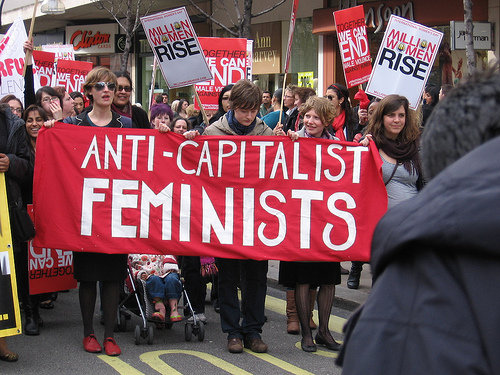Fightback Statement for Million Women Rise March 2008

Today, we march alongside women on the Million Women Rise March with solidarity and respect. We are energised and excited to be a part of a rising tide of feminist activism. We are here to march and to show our resistance to the continued oppression and exploitation that the majority of women the world over continue to experience. We therefore think it is more important than ever to build a movement and develop a feminist politics that can fight for liberation and equality. Because of this, we think it is crucial for us to think hard about the kind of feminism that we want to work for…
We are feminists who want to link our fight for women rights with other movements for social justice and all struggles against capitalism and exploitation. We think as feminists it is crucial that we build alliances between these different struggles and to focus on the ways in which they interconnect. We do not think it is useful to prioritise one form of oppression over another, or to focus simply on women’s rights as separate from a wider system of exploitation. The privileging of gender (above race, sexuality or class) leads to the idea of women as eternal victims; to an ahistorical and static concept of patriarchy or male power; and to fruitless competition over who is ‘more oppressed’ according to different identity categories. This approach has been heavily criticised for taking the experience of white middle class women as standard and ignoring the experience of BME and working class women.
We understand all oppressions to be rooted within capitalism and the racist and patriarchal ideologies it produces. For this reason we do not think that real liberation for women can be achieved without also fighting capitalism. By capitalism we mean a system of power and control, which relies upon the exploitation of the working class and that puts profit before the needs people and the planet.
Violence and exploitation take many forms. It is of course crucial to oppose rape and sexual abuse but equally it must be understood that violence is not just perpetrated by individuals, but also by the state and in the name of big business. Immigration controls, sweatshop labour, poverty, police brutality, military imperialism and the denial of reproductive freedom are all forms of violence and must be named as such and opposed by all.
We support all women organising in their workplaces and against their bosses, be they sex workers, sweatshop workers or supermarket workers, teachers or train drivers, and we stand in solidarity with all women fighting for their rights- wherever they are in the world. For this reason we oppose the Million Women’s Rise definition of prostitution which links domestic abuse, rape and commercial sexual exploitation. For the thousands of women who work in the sex industry this demand is not only offensive but dangerous. To deny women the ability to choose to work in the sex industry is to deny their fight for better wages and working conditions. The demand to criminalise sex workers and the sex industry only serves to further the marginalisation and exploitation that sex workers currently face.
We want our campaigns and politics to empower women to fight their own exploitation rather than to depend on others for protection. We do not think a feminist movement should look to charitable organisations or ‘experts’ to bestow our rights upon us, but that we should build a movement involving as many women and men as possible to bring about liberation from below.
We demand:
Reproductive freedom for all – including abortion on demand; a free publicly-funded health service; increased benefits for single mothers; IVF access for same sex couples and single women; better sex education and an end to forced sterilisation.
A living wage and safe working conditions for all workers, including migrants without papers.
Support for independent trade unions.
Freedom of movement for all, an end to the deportation of all migrants and asylum seekers and the abolition of detention centres.
The decriminalisation of sex work and support for the unionisation of sex workers.
An end to the curtailment of civil liberties and the criminalisation of ethnic and religious minority communities.

Leave a comment
You must be logged in to post a comment.